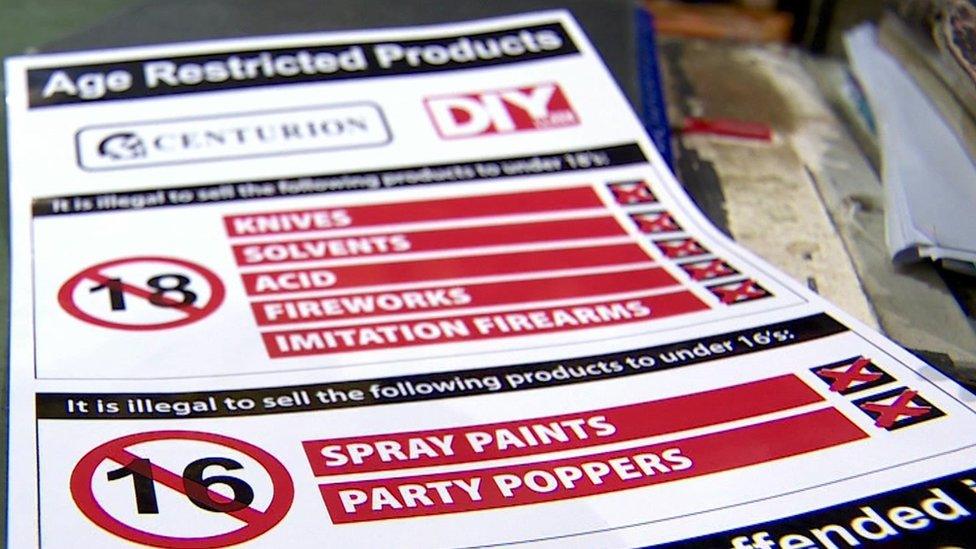Acid attacks: Retailers sign up to voluntary ban on acid sales
- Published

Some of the UK's largest retailers have agreed to voluntarily stop sales of acids, external to customers under 18 years old.
A number of DIY stores and supermarkets have signed up to the ban, which will apply to some corrosive substances, including concentrated acids.
The Home Office has already proposed new laws to limit the sale of corrosive substances amid continuing concern over rising numbers of acid attacks.
A fifth of acid attackers identified in 2016-17 were under 18 years old.
The proposed legislation would make it unlawful to sell the substances to under-18s, and also make it a criminal offence to be in possession of acid in a public place without good reason.
The move would bring the law for household acids and harmful chemicals that are not already subject to legal restrictions into line with crimes relating to knives.
The public consultation on that proposal, which will have to go through Parliament, closed last month.
In the meantime, DIY chains B&Q, Screwfix and Wickes have committed to impose their own voluntary bans on sales to under-18s.
Supermarkets including Tesco, Waitrose, Morrisons and the Co-Op have also signed up.
The BBC has contacted the retailers to ask if they stock products affected by the ban.
Morrisons and Co-Op - the only firms to respond so far - both said they do not currently stock any products included in the ban.
The British Independent Retailers Association, which includes independent DIY and hardware shops, will also ask its members to sign up to the new voluntary ban.
Under it, retailers will agree not to sell to under-18s any of their products that contain harmful levels of acid or other corrosive substances, such as powerful drain cleaners.
The restrictions will apply to drain cleaners containing sulphuric acid, as well as paint strippers, limescale removers and other cleaning products with an acid concentration of more than 10% or 12%.
Staff will be expected to challenge buyers to prove their age in the same way that they do for solvents, spray paints and knives.
Crime minister Victoria Atkins said: "I'm pleased that so many of the UK's major retailers are joining our fight... and signalling they are committed to selling acids responsibly.
"This is the next step of our acid attacks action plan, external that has already seen us consult on new laws to restrict young people's access to acids."
However, former chief prosecutor for the North West, Nazir Afzal, says the voluntary ban does not go far enough.
'Cowardly and craven'
He said shops will not be sanctioned if they do not abide by the rules.
He added: "The other issue is online; I checked and you can buy sulphuric acid at 96% strength, which will burn your face off, for £10 on next day delivery.
"Until you tackle that issue, you're only playing with it rather than tackling it."
Russell Findlay, who had sulphuric acid thrown in his face three years ago, said the move was a "step in the right direction" and "a good thing".
However, he said he doubted what impact it would have on people determined to carry acid, and said it was necessary for young people to receive better education.
He told the BBC: "These young gang members, they need to be made to realise how cowardly and craven these acts are."
What should you do in case of a chemical burn?
In the year to last April, police recorded more than 500 attacks in England and Wales, double the number five years ago, with the majority of incidents in London.
The true level of acid crimes may be much higher than official records show.
A Freedom of Information request found the Metropolitan Police alone recorded more than 450 noxious or corrosive fluid incidents in London in 2016.
A Home Office analysis estimated the true national rate could be as high as 900 crimes a year.
Honour crimes
The Home has also said experts at the University of Leicester are beginning detailed research into the characteristics and motivations of attackers.
Acid or other corrosive chemicals have been a weapon in a range of crimes, including revenge, so-called "honour crimes", gang violence and theft from delivery drivers.
In one of the most serious recent cases, a man who threw acid in a packed London nightclub, injuring 22 people, was jailed for 20 years.
Another man is facing trial later this year for the alleged murder of a woman who died after she was splashed with a corrosive substance.